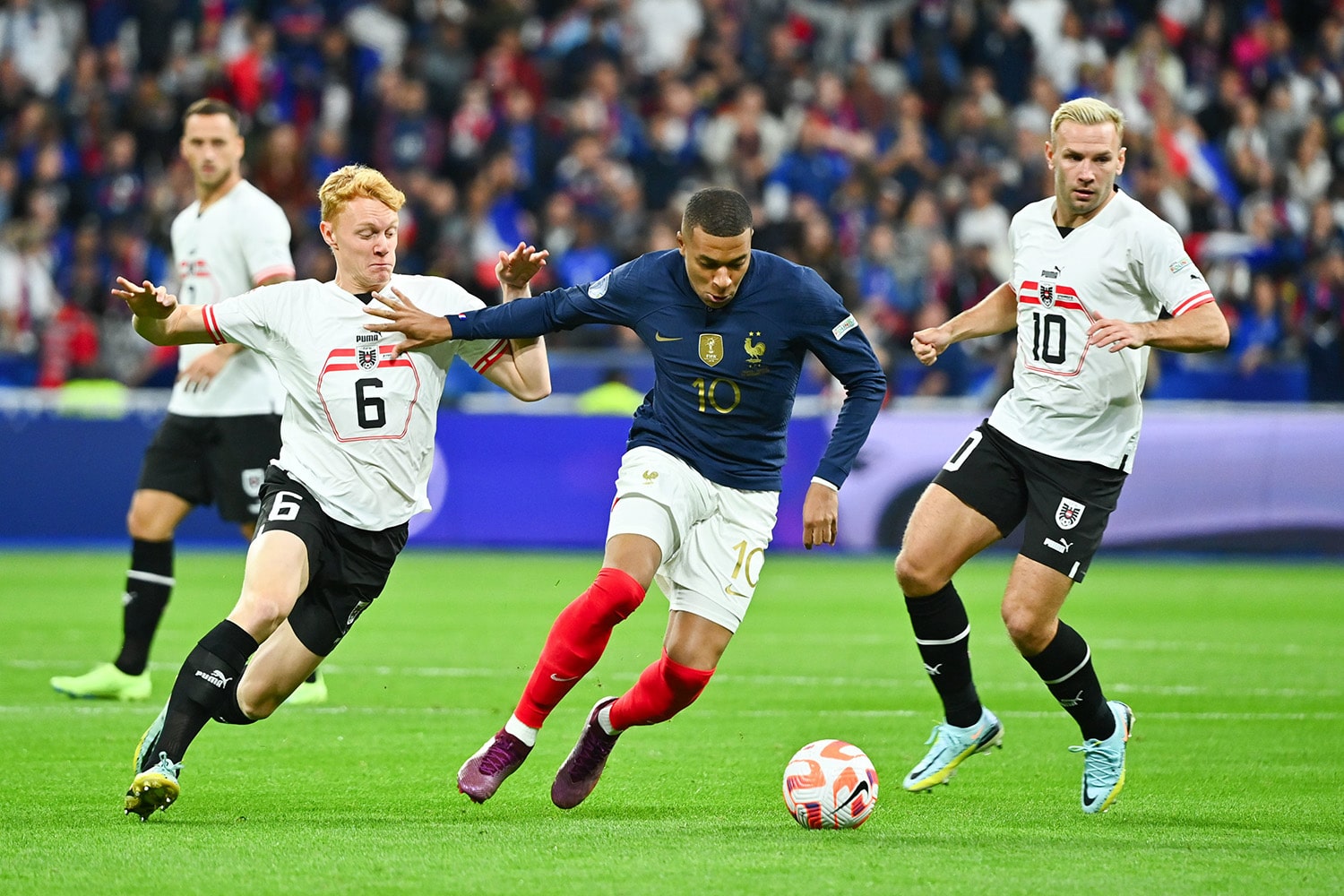The Architects of Ascension: Footballers Who Reshaped National Team Rankings
Football, the world’s most beloved sport, is a tapestry woven with threads of national pride, collective effort, and individual brilliance. While success on the international stage is often attributed to strategic coaching, robust federations, and the emergence of a "golden generation," it is undeniable that certain transcendent footballers have, through sheer talent, leadership, and consistent performance, profoundly altered their national team’s trajectory and standing in the global hierarchy. These are the individuals who didn’t just play for their country; they elevated it, transforming perceptions, inspiring future generations, and indelibly changing their nation’s ranking in the competitive landscape of international football.
The concept of "national team rankings" is multifaceted. While the FIFA World Rankings offer a quantifiable metric, the true measure of a team’s standing also lies in its historical prestige, its consistent presence in major tournament knockouts, and its reputation as a formidable opponent. This article delves into the careers of players who, in various eras, became the catalysts for such shifts, moving their nations from respected contenders to undisputed powerhouses, or from perpetual underdogs to legitimate threats.
The Pioneers of Dominance: Cementing a Legacy
Before the advent of sophisticated ranking systems, a nation’s standing was largely defined by its World Cup triumphs and consistent performances. Certain players emerged as the very embodiment of their nation’s footballing identity, single-handedly lifting their teams to unprecedented heights and cementing their place among the elite.
Pelé (Brazil): The Birth of a Dynasty
No discussion of national team elevation can begin without Edson Arantes do Nascimento, Pelé. Before his arrival, Brazil was a footballing nation with immense potential but no World Cup title. Pelé’s explosion onto the scene in 1958, a prodigious 17-year-old talent, changed everything. His three World Cup triumphs (1958, 1962, 1970) not only established Brazil as the undisputed footballing superpower but also defined an era of "Joga Bonito" – the beautiful game. Pelé wasn’t just a prolific goal-scorer; he was a revolutionary force, combining power, skill, and an innate understanding of the game. His presence alone commanded respect, intimidated opponents, and inspired generations. He transformed Brazil from a respected footballing nation into the undisputed global superpower, a position they would largely maintain for decades, consistently ranked at or near the top of any informal or formal ranking system.
Franz Beckenbauer (West Germany): The Kaiser’s Reign
If Pelé was Brazil’s artist, Franz Beckenbauer was West Germany’s elegant architect. "Der Kaiser" redefined the role of the libero, orchestrating play from the back with unparalleled vision and composure. His leadership guided West Germany to the UEFA European Championship in 1972 and the FIFA World Cup in 1974. Beckenbauer’s influence transcended individual brilliance; he epitomized German efficiency, tactical discipline, and a winning mentality. Under his captaincy, West Germany became a consistent fixture in major tournament finals, solidifying their reputation as a perennial powerhouse, always among the top contenders, a status they had flirted with but arguably cemented with Beckenbauer at the helm.
Diego Maradona (Argentina): The Singular Genius
Diego Maradona’s impact on Argentina’s national team is perhaps the most vivid example of one player’s ability to almost single-handedly alter a nation’s ranking and destiny. While Argentina had won the World Cup in 1978, it was Maradona’s incandescent performance in 1986 that truly cemented their place in footballing folklore. His "Hand of God" and the "Goal of the Century" against England encapsulated his unique blend of cunning and unparalleled genius. Maradona dragged a talented but not necessarily world-beating Argentina squad to the pinnacle of global football. His charisma, audacity, and unmatched skill made Argentina a feared opponent and a must-watch team. For years, Argentina’s standing in the football world was synonymous with Maradona’s presence, a testament to his singular ability to elevate his nation’s competitive stature.
The Modern Pillars: Sustaining and Elevating Elite Status
In the modern era, with more sophisticated scouting, globalized leagues, and detailed ranking systems, the challenge of elevating a national team has become even more complex. Yet, certain players have risen to the occasion, either by maintaining their nation’s elite status or by pushing them beyond historical limitations.
Zinedine Zidane (France): The Magician’s Touch
France, historically, was a respected footballing nation but not a dominant force until the late 1990s. The arrival of Zinedine Zidane as the team’s creative fulcrum transformed them. His elegant control, sublime passing, and uncanny ability to perform on the biggest stages propelled France to their first FIFA World Cup title in 1998 and the UEFA European Championship in 2000. Zidane was the calm, artistic heartbeat of a formidable French side, turning them into a global powerhouse. His influence extended beyond goals and assists; he instilled a winning mentality and a confidence that saw France consistently ranked among the top nations for over a decade, a level of consistent elite performance they had never previously achieved.
Cristiano Ronaldo (Portugal): From Dark Horse to Champion
Portugal, despite producing individual talents, was often seen as a perennial dark horse, capable of reaching semi-finals but rarely clinching major trophies. Cristiano Ronaldo changed this narrative entirely. From his debut, he became the undisputed leader and talisman, shattering goal-scoring records and pushing the boundaries of what was possible for his national team. His relentless drive, unparalleled athleticism, and clutch performances culminated in Portugal’s historic UEFA European Championship triumph in 2016 and the inaugural UEFA Nations League in 2019. Ronaldo didn’t just elevate Portugal’s ranking; he transformed their identity from a talented underachiever to a proven champion, solidifying their place among Europe’s elite and significantly boosting their FIFA ranking for years.
Lionel Messi (Argentina): The Ultimate Redemption
For years, Lionel Messi carried the immense weight of expectation for Argentina, frequently leading them to finals but falling short of the ultimate prize. Despite his club success, Argentina’s FIFA ranking often fluctuated, always high but never quite solidified as the undisputed number one. Yet, Messi’s sheer longevity, consistent brilliance, and unwavering commitment meant Argentina remained a top-tier nation throughout his career. His leadership in the 2021 Copa América, ending a 28-year trophy drought, and especially his transcendent performance in the 2022 FIFA World Cup, finally delivered the elusive global title. This triumph not only propelled Argentina to the very top of the FIFA rankings but also secured their place as a modern footballing dynasty, a legacy undeniably built around Messi’s sustained excellence and ultimate triumph.
Andrés Iniesta & Xavi Hernández (Spain): The Tiki-Taka Revolution
Spain, famously, was a nation that underperformed despite immense talent, often dubbed "the eternal quarter-finalists." The emergence of Andrés Iniesta and Xavi Hernández, the midfield maestros of Barcelona’s "tiki-taka" philosophy, fundamentally transformed the Spanish national team. Their telepathic understanding, unparalleled passing range, and ability to control the tempo of any game allowed Spain to dominate international football like never before. Together, they orchestrated Spain’s unprecedented treble: UEFA European Championship in 2008, FIFA World Cup in 2010, and another UEFA European Championship in 2012. This era saw Spain ascend to the very top of the FIFA rankings, holding the coveted number one spot for extended periods, a testament to how two players, through their unique synergy, could redefine a nation’s footballing identity and global standing.
Elevating the Underdogs: Reaching New Heights
Beyond the traditional powerhouses, certain players have taken nations with less established footballing pedigrees and elevated them to unprecedented levels of respect and competitiveness, significantly improving their FIFA rankings and global perception.
Didier Drogba (Ivory Coast): The Elephant’s Roar
Didier Drogba was more than just a striker for Ivory Coast; he was a national icon and the driving force behind their "Golden Generation." Prior to his era, Ivory Coast had never qualified for a FIFA World Cup. Drogba led them to three consecutive World Cup appearances (2006, 2010, 2014) and multiple Africa Cup of Nations finals, though a title eluded him. His powerful presence, leadership, and prolific goal-scoring put Ivorian football on the global map, significantly raising their profile and FIFA ranking, making them a consistent top-tier African nation and a respected opponent on the world stage.
Luka Modrić (Croatia): The Unwavering Maestro
Croatia, a nation of just four million people, emerged as a footballing force in the late 1990s but then seemed to stagnate. Luka Modrić, the diminutive midfielder with unparalleled vision and tireless energy, revived their fortunes. As captain, he led Croatia to a remarkable FIFA World Cup final in 2018 and a third-place finish in 2022, defying all expectations. Modrić’s sustained excellence, leadership, and ability to dictate play transformed Croatia into a team capable of challenging the very best. His influence saw Croatia consistently punch above their weight, maintaining a remarkably high FIFA ranking for a nation of its size, a testament to his transformative impact.
Eden Hazard & Kevin De Bruyne (Belgium): The Golden Generation’s Core
For decades, Belgium was known for sporadic talent but lacked consistency. The emergence of players like Eden Hazard and Kevin De Bruyne, along with a host of other world-class talents, ushered in Belgium’s "Golden Generation." These creative forces, with their sublime skill and tactical intelligence, propelled Belgium to the top of the FIFA World Rankings for several years, a truly unprecedented achievement for the nation. While a major trophy has eluded them, their consistent presence in the latter stages of major tournaments and their long reign as the world’s number one ranked team underscore the profound impact these players had on elevating Belgium’s footballing stature.
The Multifaceted Impact of Individual Brilliance
The influence of these footballers goes beyond mere statistics. Their impact is multifaceted:
- On-Field Performance: Goals, assists, defensive solidity, and match-winning moments directly translate into victories, which are the primary drivers of FIFA ranking points.
- Leadership and Inspiration: Captains like Modrić and Ronaldo galvanize their teammates, instilling belief and a winning mentality. Their presence can elevate the performance of those around them.
- Global Recognition and Investment: A superstar player brings global attention to their national team. This can attract better coaching, investment in youth academies, and increased commercial opportunities, creating a virtuous cycle of improvement.
- Psychological Edge: Opponents often enter matches against teams with such generational talents with a degree of apprehension, knowing that a single moment of brilliance can change the game.
- Inspiring Future Generations: The success of players like Pelé or Messi inspires millions of children in their respective countries to pursue football, contributing to a deeper talent pool in the long run.
Conclusion: More Than Just a Number
While the FIFA World Rankings offer a snapshot of a national team’s current standing, the stories of these footballers reveal a deeper truth: rankings are not static, and they are significantly influenced by the transcendent abilities of a select few. These players were not merely participants; they were architects, sculptors, and catalysts who, through their unparalleled skill, unwavering dedication, and magnetic leadership, lifted their national teams from respected contenders to dominant forces, or from overlooked nations to genuine threats.
They changed not just numbers on a chart, but perceptions, expectations, and the very identity of their national football. Their legacies are etched not only in trophy cabinets but in the enduring pride of their nations, demonstrating that in the beautiful game, individual brilliance can indeed reshape the destiny of an entire country.



